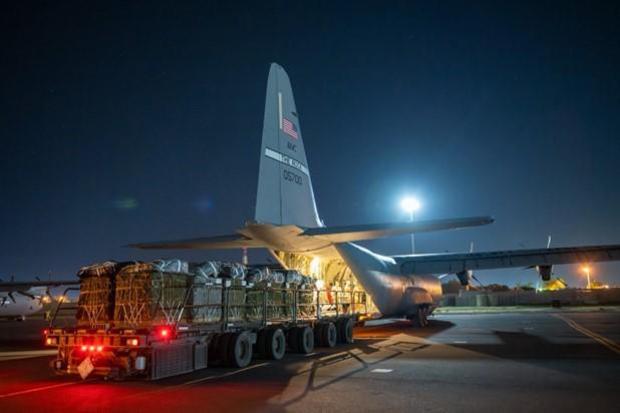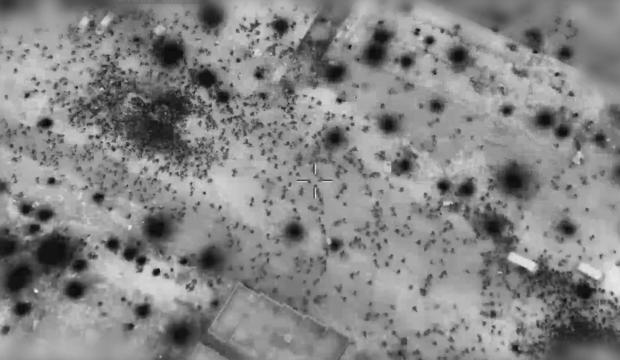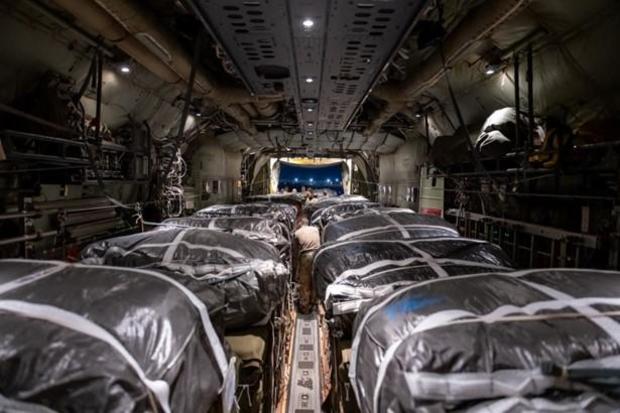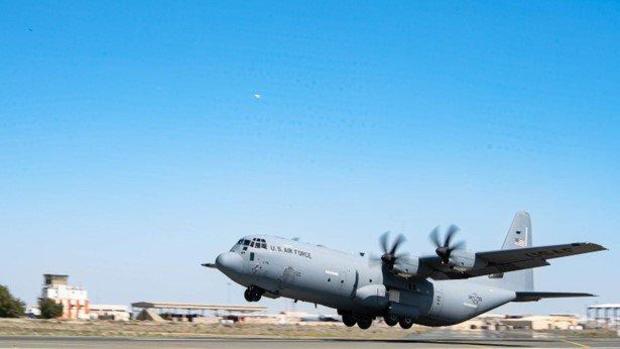U.S. military aircraft airdrop thousands of meals into Gaza in emergency humanitarian aid operation
U.S. military C-130 cargo planes on Saturday dropped food in pallets over Gaza, three U.S. officials said, two days after more than 100 Palestinians who had surged to pull goods off an aid convoy were killed during a chaotic encounter with Israeli troops.
U.S. Central Command and the Royal Jordanian Air Force conducted a combined humanitarian assistance airdrop into Gaza, CENTCOM said in a statement. A defense official told CBS News three U.S. C-130 cargo planes dropped 66 total bundles, equating to about 38,000 pork-free meals, into the territory on Saturday morning. The bundles were split between three planes, the official said.
The airdrop is expected to be the first of many announced by President Biden on Friday. The aid will be coordinated with Jordan, which has also conducted airdrops to deliver food to Gaza. A U.S. official said that the next drop is planned for Wednesday.

"These airdrops are part of a sustained effort to get more aid into Gaza, including by expanding the flow of aid through land corridors and routes," the statement said, adding that the military is "conducting planning for potential follow-on airborne aid delivery missions."
Some international aid agencies are sharply criticizing Mr. Biden's decision to air drop food into Gaza, saying it will do little to help those who are starving. U.S. officials have acknowledged to CBS News that the airdrops are insufficient, but are being done as a statement that the world is not just standing by and watching a famine unfold.
At least 115 Palestinians were killed and hundreds more wounded in the Thursday attack as they scrambled for aid, the Health Ministry in Hamas-ruled Gaza said. Israel says many of the dead were trampled in a chaotic crush for food aid, and its troops fired warning shots after the crowd moved toward them in a threatening way.
White House national security spokesperson John Kirby said Friday that the airdrops were being planned to deliver emergency humanitarian assistance in a safe way to people on the ground.

The C-130 cargo plane is a widely used military jet to deliver aid to remote places due to its ability to land in austere environments and cargo capacity. It airlift as much as 42,000 pounds of cargo and its crews know how to rig the cargo, which sometimes can include even vehicles, onto massive pallets can be safely dropped out of the back of the aircraft.

Air Force loadmasters secure the bundles onto pallets with netting that is rigged for release in the back of a C-130, and then crews release it with a parachute when the aircraft reaches the intended delivery zone.
The Air Force's C-130 has been used in years past to air drop humanitarian into Afghanistan, Iraq, Haiti and other locations and the airframe is used in an annual multi-national "Operation Christmas Drop" that air drops pallets of toys, supplies, nonperishable food and fishing supplies to remote locations in the Federated States of Micronesia and the Republic of Palau.

The airdrop came on the same day that a senior U.S. administration official said that Israel has essentially endorsed the framework of a proposed Gaza cease-fire and hostage release deal, and it is now up to Hamas to agree to it, a day before talks to reach an agreement were to resume in Egypt.
A U.S. official told CBS News that "there's a deal on the table" for a six-week cease-fire that would see Hamas release hostages considered vulnerable, which includes the sick, the wounded, the elderly and women.
"It's essential that we see a cease-fire in Gaza and the path to a ceasefire, right now literally at this hour, is straightforward...There's a framework deal. The Israelis have more or less accepted it. And there will be a six week ceasefire in Gaza starting today. If Hamas agrees to release," the official said.
Officials from Israel and from Hamas did not immediately respond to requests for comment.
Since the war began on Oct. 7, Israel has barred entry of food, water, medicine and other supplies, except for a trickle of aid entering the south from Egypt at the Rafah crossing and Israel's Kerem Shalom crossing.
The United Nations says a quarter of Gaza's 2.3 million people face starvation. Aid officials have said that airdrops are not an efficient means of distributing aid and are a measure of last resort.
U.S. Vice President Kamala Harris is set to meet with Israeli government minister Benny Gantz on Monday. The meeting "is part of our continued efforts to engage with a wide range of Israeli officials on the war in Gaza and planning for the day after," a White House official told CBS News.
Harris will also reiterate concerns about civilian casualties and the situation in Rafah during the meeting, the official said. Gantz will also meet with National Security Advisor Jake Sullivan.
Eleanor Watson contributed to this report.
- In:
- Hamas
- Israel
- Gaza Strip
Disclaimer: The copyright of this article belongs to the original author. Reposting this article is solely for the purpose of information dissemination and does not constitute any investment advice. If there is any infringement, please contact us immediately. We will make corrections or deletions as necessary. Thank you.







